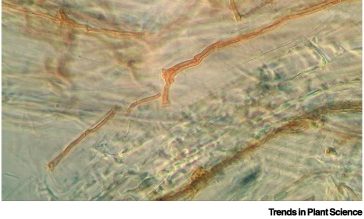What kind of eco-evolutionary interactions between host plants and fungal symbionts occur in DSE symbioses?
What is the role of by-product benefits in the evolution of mycorrhizal symbioses?

Highlights
Plant roots are abundantly colonized by DSE fungi in virtually all ecosystems, but the biology and ecological roles of these ubiquitous fungi are poorly understood.
Development of genomics and other molecular methods has made research of root-associated fungal communities (including DSE symbiosis) timely.
Understanding DSE symbiosis requires holistic evolutionary ecological approach. We consider by-product mutualism (sensu Connor Biol Rev. 1995;70:427–457) as a framework and present a schematic hypothesis of evolution of plant‐symbiont interactions.
By-product mutualisms may be an important step between free-living saprotrophs and mutualistic mycorrhizal symbioses.
Outstanding questions
What kind of eco-evolutionary interactions between host plants and fungal symbionts occur in DSE symbioses?
What is the role of by-product benefits in the evolution of mycorrhizal symbioses?